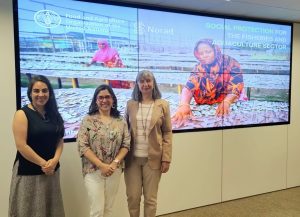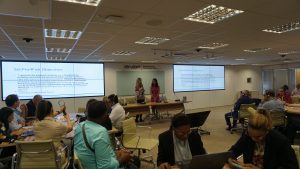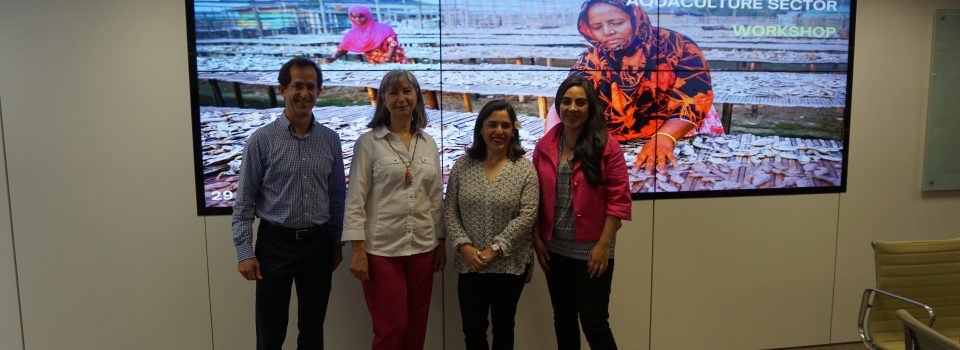IFOP researchers Nancy Barahona and Andrea Araya participate in a social protection for fishing and aquaculture sector workshop in Brazil
December 13th, 2023 Between November 29th and December 1rst, United Nations (FAO) Food and Agriculture Organization held a “Social protection for fishing and aquaculture sector” Workshop in Brasilia, Brazil. This activity was attended on behalf of Chile by Nancy Barahona Toledo IFOP Fisheries Evaluation Department’s Head, along with Andrea Araya Arriagada researcher from Economics Section. While, as a State’s institutions representative, Ivonne Montenegro Urbina, Fisheries and Aquaculture Undersecretariat Sectoral Analysis Department professionals also participated.
Between November 29th and December 1rst, United Nations (FAO) Food and Agriculture Organization held a “Social protection for fishing and aquaculture sector” Workshop in Brasilia, Brazil. This activity was attended on behalf of Chile by Nancy Barahona Toledo IFOP Fisheries Evaluation Department’s Head, along with Andrea Araya Arriagada researcher from Economics Section. While, as a State’s institutions representative, Ivonne Montenegro Urbina, Fisheries and Aquaculture Undersecretariat Sectoral Analysis Department professionals also participated.
The workshop included an experiences exchange between various countries that expressed their interest to FAO in learning about suitable fishing sector social protection measures expansion. Among participants were Tunisia, Cape Verde, Colombia, Ecuador, Peru, Brazil, Paraguay and Chile, as well as International Labor Organization, among other institutions. In this space, each country presentations were highlighted, generating significant discussions about their respective social protection programs aimed at fishing and aquaculture sector; which addressed different aspects related to social protection programs implementation cycle, fisheries and social registries, revolving funds, community social protection programs and alternative livelihood programs and fishermen productive inclusion during closed seasons. In addition, a panel was held where the fishermen themselves shared their challenges, vulnerabilities and social protection needs. In this workshop, Chile presented a work titled: Social protection programs accessible to fishermen, including strengths and challenges.
 FAO is working to increase social protection coverage for fisheries and aquaculture sector, with the fundamental purpose of improving fishery resources management, rehabilitating communities that depend on fishing and aquaculture livelihoods, and increasing their capacity. resilience to social and governmental changes, resources availability, environmental changes, among others. To achieve this goal, FAO is strengthening coordination and dialogue with relevant entities to expand social protection scope in fisheries and aquaculture sector. This approach, in turn, provides support to member countries to achieve Sustainable Development Goals (SDGs) (especially SDGs 1.3 and 1.5) and implement Voluntary Guidelines for Achieving Sustainability of Small-Scale Fisheries in the Context of food security and poverty eradication (SPP Guidelines). Both instruments highlight the importance of the sector socioeconomic development .
FAO is working to increase social protection coverage for fisheries and aquaculture sector, with the fundamental purpose of improving fishery resources management, rehabilitating communities that depend on fishing and aquaculture livelihoods, and increasing their capacity. resilience to social and governmental changes, resources availability, environmental changes, among others. To achieve this goal, FAO is strengthening coordination and dialogue with relevant entities to expand social protection scope in fisheries and aquaculture sector. This approach, in turn, provides support to member countries to achieve Sustainable Development Goals (SDGs) (especially SDGs 1.3 and 1.5) and implement Voluntary Guidelines for Achieving Sustainability of Small-Scale Fisheries in the Context of food security and poverty eradication (SPP Guidelines). Both instruments highlight the importance of the sector socioeconomic development .
Within this work, priority area framework and with Norwegian Agency for Development Cooperation (Norad) support, through the social protection component for fisheries and aquaculture (SocPro4Fish) of “Responsible use of fisheries and aquaculture resources for sustainable development” (GCP/GLO/352/NOR) project, FAO is carrying out various initiatives to expand its sector social protection coverage, access and adequacy. Such activities include building capacity to effectively implement and expand social protection in the sector, conducting impact assessments of social protection programs such as unemployment insurance during Brazil’s closed seasons, and developing a global database of the sector’s social protection programs, which serve to carry out a trends detailed analysis, deficiencies, barriers and opportunities for social protection programs implementation as well as to promote better coherence between social protection, fisheries management and conservation. In addition to implementing activities in Colombia, Tunisia and Paraguay, FAO is also implementing actions in collaboration with other countries, and through this workshop, it promoted an exchange of South-South cooperation, aimed mainly at sharing lessons learned and effective strategies to expand successful interventions.
